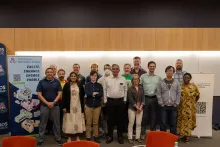ML/AI Workshops Equip Faculty with AI in Action Zone
The Data Science Institute (DSI) hosted the "Building Learning Materials to Teach Introductory Applied ML/AI" workshops on May 6-7 and June 20-21, 2024 at the University of Arizona. The workshops brought together faculty and University of Arizona experts to share knowledge and resources to enhance their ability to teach machine learning and use artificial intelligence tools (ML/AI). Nirav Merchant, Director of the University of Arizona Data Science Institute, and his colleagues designed the workshops as part of the SouthWest Expertise in Expanding Training, Education and Research project (SWEETER) which promotes regional cyber expertise across Texas, New Mexico, and Arizona by building and enabling peer-to-peer research and training support.

Among the faculty were Dr. Hikmet Budak (Arizona Western College), Bhagya Patil (Navajo Technical University), Devin Bayly (Research Technologies) and Dennis Just and Reed Dickson (Pima Community College). They engaged in hands-on sessions designed to introduce ML/AI learning materials tailored to their unique educational environments. They explored various tools and resources, identifying challenges and discovering low-cost technology options and funding opportunities to enhance ML/AI education.
Key aspects of the May workshop included introductions to contemporary computing resources like GPUs, recent-generation CPUs, Jupyter/RStudio notebooks, and cloud access. Drawing on their expertise in higher education and cyberinfrastructure, the University of Arizona team offered solutions that faculty could customize to meet the unique ML/AI needs of their students and local employers.
Dr. Hikmet Budak, Professor of Agriculture at Arizona Western College, said, “This was a fantastic Artificial Intelligence/Machine Learning workshop while learning/sharing knowledge! Together with great colleagues/friends, we worked on translating data into knowledge for our new generation students.”
Building on the May workshop, the June workshop sessions focused on creating a portable "AI in Action" zone that could be quickly assembled at college fairs, events, in classrooms, etc. The hands-on environment includes equipment and software that can help students explore how Machine Learning and AI intersect with different disciplines.
Brenda Huppenthal, a DSI graduate research assistant, showcased how using tools and simplifying AI concepts for students works. She demonstrated Teachable Machine, a tool that teaches computers to recognize images, sounds, and poses, and showed how to use the Jetson Orin Nano to run real-time computer vision applications. This AI in Action zone not only can spark curiosity, but can also become a springboard for deeper ML/AI exploration allowing students to ask questions and delve into more customized tools – students can grow from “Curiosity to Competence.”
This peer-to-peer workshop research and training support model demonstrated its potential for replication at other regional institutional partners and academic institutions. The practical examples and resources provided during the workshops resulted in a greater understanding of the needs of regional institutional partners concerning ML/AI coursework and general cyberinfrastructure.
Devin Bayly, a Data and Visualization Consultant with Research Technologies, added, "Attending the SWEETER Peer-to-Peer meeting has planted the seeds of collaboration and set us on a bright path for regional compute. Without this meeting, who knows how long it would have taken to reach this starting point."
Overall, the workshops not only enhanced the participants' teaching capabilities, but they also promoted collaboration and innovation in ML/AI education for students and educators. The SWEETER project is funded under NSF award number 1925764.
# # #

